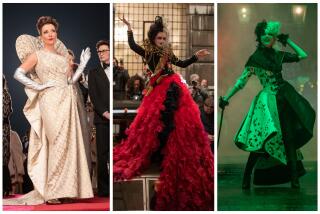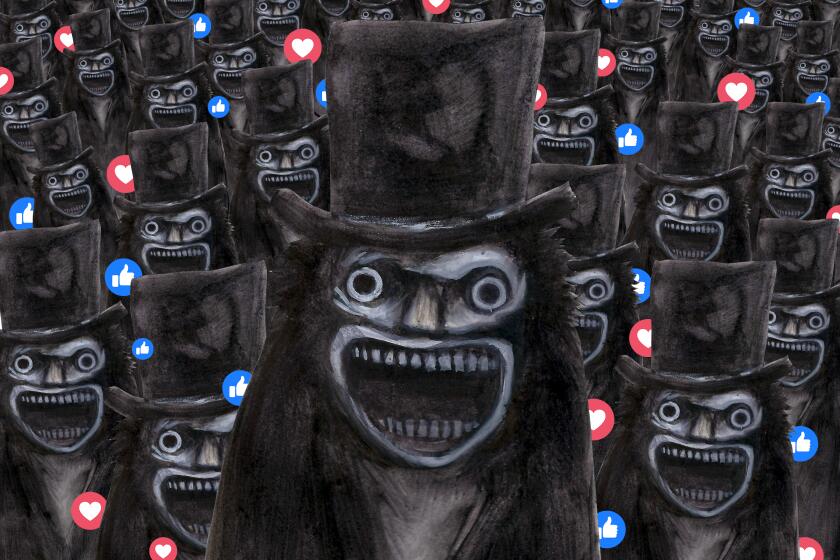Experimental films offer avant-garde angle
In 1975, in a city as rich and cultured as Los Angeles, if you wanted to catch the screening of an experimental or art film, there was pretty much only one place to go -- that was Los Angeles Filmforum. When L.A. Filmforum was established that year, its central goal was to support film as an art, filmmakers as artists and to screen alternative and noncommercial films. Adam Hyman, current executive director of Filmforum, says that Filmforum has remained remarkably true to its initial mission.
On Sunday, Filmforum launches its screening series “Alternative Projections: Experimental Film in Los Angeles 1945-1980” with the first of more than 24 screenings running from Oct. 9 through May. The series will explore experimental film, video and animation created in Southern California during the World War II era. Taking place in a variety of Los Angeles theaters, and part of the Getty-sponsored Pacific Standard Time art program, the eight-month film series features predominantly short films that convey the formalist, the outrageous, and the totally unexpected.
Hyman, who is also project supervisor of Alternative Projections, explains that experimental films typically “do not depend on a character-based narrative. Instead, they look more closely into the properties of the medium itself, such as properties of light and photographic imagery.”
“Experimental films strive to look deeper into things that otherwise go unseen. They find ways to look at the world differently, express individual notions differently and construct the story and the art differently.”
Opening the series is “Dream States: The Avant-Garde of the 1940s and 1950s” at the Spielberg Theatre, featuring eight short films in color and black and white, with sound as well as silent. The filmmakers in these selections were influenced by psychoanalysis and surrealism, and many of the featured films helped jump-start careers, such as Maya Deren’s “Meshes of the Afternoon,” made in Los Angeles in 1943, as well as “Fireworks,” directed by Kenneth Anger.
Hyman explains that all eight short films “express emotional states without worrying about the limitations of narrative comprehension. When you look at a painting, you do not need to know the narrative of the painting for it to affect you. These films attempt to do the same thing.”
The second night of Alternative Projections is presented in conjunction with REDCAT. The screening “Animation of the Unconsciousness: CalArts and the Teachings of Jules Engel” showcases the animated work of Engel along with more than a dozen animated films created by his students during the 1970s. Engel, who founded the animation program at CalArts, was a strong influence on students, many of whom, such as Kathy Rose and Henry Selick, went on to gain recognition as animators.
Unlike the animation of today, all the imagery involved is hand-crafted.
Los Angeles Filmforum’s institutional and artistic history is unique -- it is the city’s longest running organization dedicated to weekly screenings of experimental film, documentaries, animation and video art. Furthermore, it is the only venue in Southern California dedicated exclusively to the exhibition of independent, experimental film.
Experimental filmmaker and Filmforum committee member Amy Halpern conveys her passion for the organization’s long-standing commitment to screening one type of film. “Experimental film was made to develop new appetites, to blow people’s minds in a positive manner, and to do things to the eyes and to the mind that have not been done before. Its intention has always been to elevate, unite, clarify and delight everybody.”
Despite these efforts, however, experimental film is still on the fringes. David E. James, film professor at USC and author of “The Most Typical Avant-Garde: History and Geography of Minor Cinemas in Los Angeles” explains, “experimental film is something like the neglected sister of the arts. The popularity of experimental film tends to constantly rise and fall, but it is still an art form that the city in general ignores. I would hope to see more people realize that Los Angeles has more to offer than just Hollywood films.”
Having worked with L.A. Filmforum for five years, Mark Toscano, programmer for Alternative Projections, marvels that experimental film is still not much on the radar. “Part of it is limited access to the films, part of it is the sense some have that the experimental film world is hermetic and detached, but a lot of it is a knee-jerk resistance to the work and a prior bias that I cannot quite figure out,” Toscano says.
He adds, “I continue to be surprised that people who are interested in the arts, alternative music or other cultural endeavors, are still fairly resistant to any kind of alternative or experimental cinema. But I do sincerely hope that this series will interest people who may not normally view films like this, whether they be art-curious film people, film-curious art people, or anybody in between.”
For complete program information, including films, venues, times and prices, go to: www.lafilmforum.org/index/Symposium.html.
--
More to Read
Only good movies
Get the Indie Focus newsletter, Mark Olsen's weekly guide to the world of cinema.
You may occasionally receive promotional content from the Los Angeles Times.






